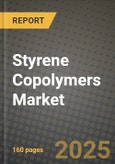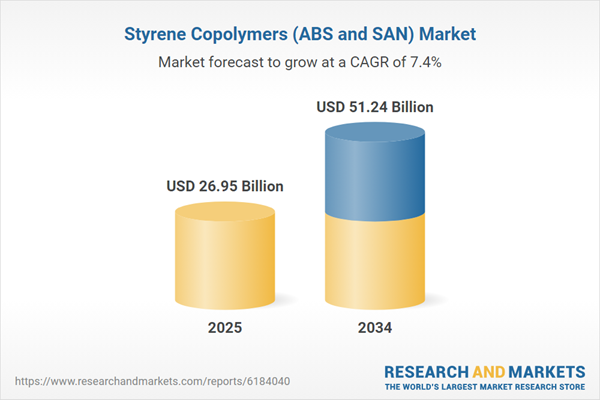Styrene Copolymers (ABS and SAN) Market
Styrene copolymers - acrylonitrile-butadiene-styrene (ABS) and styrene-acrylonitrile (SAN) - are engineering thermoplastics prized for a balance of toughness, stiffness, aesthetics, and processability. ABS dominates in automotive interiors, appliance housings, power tools, toys, consumer electronics, piping/fixtures, and 3D-printing filaments, while SAN serves transparent/chemical-resistant applications in small appliances, cosmetics packaging, and medical device housings/containers. Buyers value colorability, low gloss/matte finishes, paint-free textures, and consistent mold flow across complex geometries. Current trends include PC/ABS and ASA/ABS blends for elevated heat/UV stability; halogen-free FR grades for e-mobility and electronics; low-odor/low-VOC interior materials; antistatic and antimicrobial additive packages; and aesthetic surfaces that bypass secondary painting. On the supply side, performance and pricing hinge on upstream styrene, acrylonitrile, and butadiene dynamics, with capacity heavily concentrated in Asia alongside global compounding networks. OEMs push circularity via mechanically recycled ABS (rABS) in non-critical parts, closed-loop scrap recovery from molding lines, and early trials of dissolution/chemical recycling to styrene and acrylonitrile. Regulatory momentum (indoor air quality limits, REACH/RoHS compliance, ELV guidance) shapes formulations toward cleaner stabilizers and FR systems. Competitive differentiation rests on application support, global color matching, lot-to-lot consistency, and validated data for UV/weathering, scratch/mar, and fogging. Process flexibility - high-throughput injection, gas-assist, structural foam, sheet extrusion, thermoforming - broadens use cases. Over the medium term, growth follows appliance and automotive refresh cycles, premiumization in consumer electronics, and infrastructure/fixtures, while risk centers on raw-material volatility, energy costs, and qualification lead times for recycled grades.Styrene Copolymers (ABS and SAN) Market Key Insights
- Application breadth with tiered specs
- Interior air-quality and low-odor push
- Flame-retardant modernization
- Aesthetics without paint
- Circularity moves from pilots to programs
- Resin-cost exposure management
- Processing productivity as a KPI
- E-mobility and electronics uplift
- Regulatory and materials stewardship
- Design for durability and repair
Styrene Copolymers (ABS and SAN) Market Reginal Analysis
North America
Demand tied to appliances, power tools, recreational products, and automotive interiors. OEMs emphasize low-odor cabin materials, halogen-free FR, and paint-free aesthetics to cut costs and emissions. Regional compounding supports color consistency and JIT. Recycled ABS adoption grows in non-critical parts with OEM-approved specs. Energy and feedstock swings drive indexed pricing and safety-stock strategies.Europe
Stringent stewardship (REACH, ELV) accelerates low-emission formulations and halogen-free FR adoption. Automotive interiors and premium appliances prioritize mold-in-color, matte surfaces, and UV stability. Closed-loop pilots for rABS scale with traceability requirements. Electrification programs fuel PC/ABS in EV cabins and charging infrastructure. Localized compounding and color labs ensure harmonized finishes across plants.Asia-Pacific
Largest production and consumption base with integrated styrene and ACN capacity. Appliances, consumer electronics, toys, and two-wheeler/auto interiors anchor volumes. Rapid model cycles favor high-flow, easy-color grades; outdoor applications add ASA/ABS blends. Regional leaders invest in rABS and chemical-recycling partnerships. Competitive differentiation hinges on cost, lead time, and technical service depth.Middle East & Africa
Growth follows white-goods assembly, building fixtures, and emerging auto interiors. Import reliance for specialty grades pairs with rising regional polymer capacity. Buyers seek durable, UV-resistant, and cost-stable materials for hot climates. Distributors with color-match service and logistics reliability gain share. Standards convergence nudges adoption of halogen-free FR and low-VOC grades.South & Central America
Appliance clusters and consumer durables drive base demand; automotive recovery supports interior components and trim. Currency and freight volatility make regional compounding and safety stocks attractive. Mold-in-color and paint-elimination help manage cost and takt time. Gradual introduction of rABS occurs in non-visible parts under OEM qualification. Technical training on processing stability improves yields.Styrene Copolymers (ABS and SAN) Market Segmentation
By End-User
- Aerospace
- Automotive
- Construction
- Electronics
- Machinery
- Packaging
- Others
Key Market players
INEOS Styrolution, LG Chem, Chi Mei Corporation, Trinseo, SABIC, BASF, Kumho Petrochemical, Formosa Plastics, Lotte Chemical, Asahi Kasei, Toray, Techno-UMG, Sinopec, Versalis (Eni), Kingfa Sci. & Tech.Styrene Copolymers (ABS and SAN) Market Analytics
The report employs rigorous tools, including Porter’s Five Forces, value chain mapping, and scenario-based modelling, to assess supply-demand dynamics. Cross-sector influences from parent, derived, and substitute markets are evaluated to identify risks and opportunities. Trade and pricing analytics provide an up-to-date view of international flows, including leading exporters, importers, and regional price trends.Macroeconomic indicators, policy frameworks such as carbon pricing and energy security strategies, and evolving consumer behaviour are considered in forecasting scenarios. Recent deal flows, partnerships, and technology innovations are incorporated to assess their impact on future market performance.
Styrene Copolymers (ABS and SAN) Market Competitive Intelligence
The competitive landscape is mapped through proprietary frameworks, profiling leading companies with details on business models, product portfolios, financial performance, and strategic initiatives. Key developments such as mergers & acquisitions, technology collaborations, investment inflows, and regional expansions are analyzed for their competitive impact. The report also identifies emerging players and innovative startups contributing to market disruption.Regional insights highlight the most promising investment destinations, regulatory landscapes, and evolving partnerships across energy and industrial corridors.
Countries Covered
- North America - Styrene Copolymers (ABS and SAN) market data and outlook to 2034
- United States
- Canada
- Mexico
- Europe - Styrene Copolymers (ABS and SAN) market data and outlook to 2034
- Germany
- United Kingdom
- France
- Italy
- Spain
- BeNeLux
- Russia
- Sweden
- Asia-Pacific - Styrene Copolymers (ABS and SAN) market data and outlook to 2034
- China
- Japan
- India
- South Korea
- Australia
- Indonesia
- Malaysia
- Vietnam
- Middle East and Africa - Styrene Copolymers (ABS and SAN) market data and outlook to 2034
- Saudi Arabia
- South Africa
- Iran
- UAE
- Egypt
- South and Central America - Styrene Copolymers (ABS and SAN) market data and outlook to 2034
- Brazil
- Argentina
- Chile
- Peru
Research Methodology
This study combines primary inputs from industry experts across the Styrene Copolymers (ABS and SAN) value chain with secondary data from associations, government publications, trade databases, and company disclosures. Proprietary modeling techniques, including data triangulation, statistical correlation, and scenario planning, are applied to deliver reliable market sizing and forecasting.Key Questions Addressed
- What is the current and forecast market size of the Styrene Copolymers (ABS and SAN) industry at global, regional, and country levels?
- Which types, applications, and technologies present the highest growth potential?
- How are supply chains adapting to geopolitical and economic shocks?
- What role do policy frameworks, trade flows, and sustainability targets play in shaping demand?
- Who are the leading players, and how are their strategies evolving in the face of global uncertainty?
- Which regional “hotspots” and customer segments will outpace the market, and what go-to-market and partnership models best support entry and expansion?
- Where are the most investable opportunities - across technology roadmaps, sustainability-linked innovation, and M&A - and what is the best segment to invest over the next 3-5 years?
Your Key Takeaways from the Styrene Copolymers (ABS and SAN) Market Report
- Global Styrene Copolymers (ABS and SAN) market size and growth projections (CAGR), 2024-2034
- Impact of Russia-Ukraine, Israel-Palestine, and Hamas conflicts on Styrene Copolymers (ABS and SAN) trade, costs, and supply chains
- Styrene Copolymers (ABS and SAN) market size, share, and outlook across 5 regions and 27 countries, 2023-2034
- Styrene Copolymers (ABS and SAN) market size, CAGR, and market share of key products, applications, and end-user verticals, 2023-2034
- Short- and long-term Styrene Copolymers (ABS and SAN) market trends, drivers, restraints, and opportunities
- Porter’s Five Forces analysis, technological developments, and Styrene Copolymers (ABS and SAN) supply chain analysis
- Styrene Copolymers (ABS and SAN) trade analysis, Styrene Copolymers (ABS and SAN) market price analysis, and Styrene Copolymers (ABS and SAN) supply/demand dynamics
- Profiles of 5 leading companies - overview, key strategies, financials, and products
- Latest Styrene Copolymers (ABS and SAN) market news and developments
Additional Support
With the purchase of this report, you will receive:- An updated PDF report and an MS Excel data workbook containing all market tables and figures for easy analysis.
- 7-day post-sale analyst support for clarifications and in-scope supplementary data, ensuring the deliverable aligns precisely with your requirements.
- Complimentary report update to incorporate the latest available data and the impact of recent market developments.
This product will be delivered within 1-3 business days.
Table of Contents
Companies Mentioned
- INEOS Styrolution
- LG Chem
- Chi Mei Corporation
- Trinseo
- SABIC
- BASF
- Kumho Petrochemical
- Formosa Plastics
- Lotte Chemical
- Asahi Kasei
- Toray
- Techno-UMG
- Sinopec
- Versalis (Eni)
- Kingfa Sci. & Tech.
Table Information
| Report Attribute | Details |
|---|---|
| No. of Pages | 160 |
| Published | November 2025 |
| Forecast Period | 2025 - 2034 |
| Estimated Market Value ( USD | $ 26.95 Billion |
| Forecasted Market Value ( USD | $ 51.24 Billion |
| Compound Annual Growth Rate | 7.4% |
| Regions Covered | Global |
| No. of Companies Mentioned | 15 |









